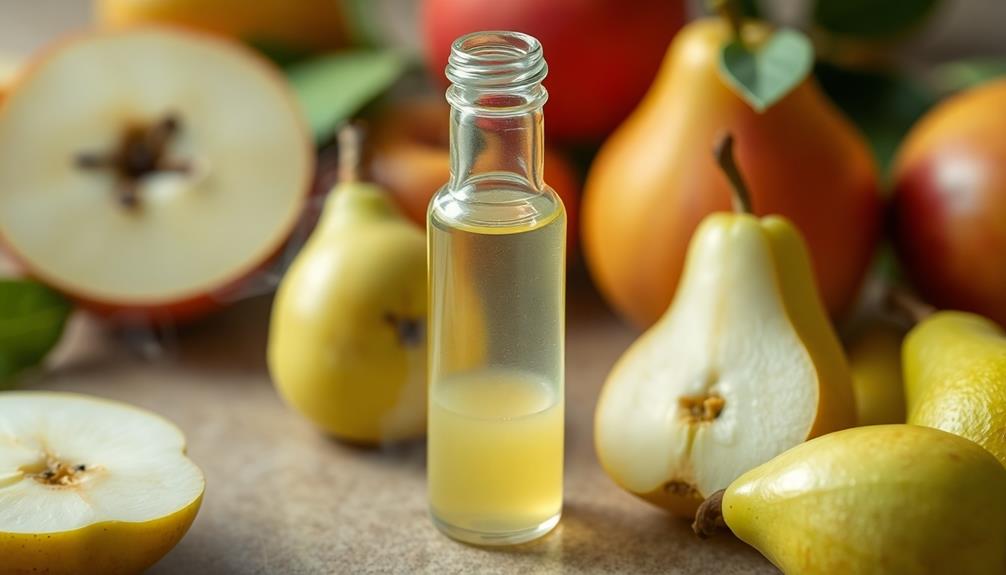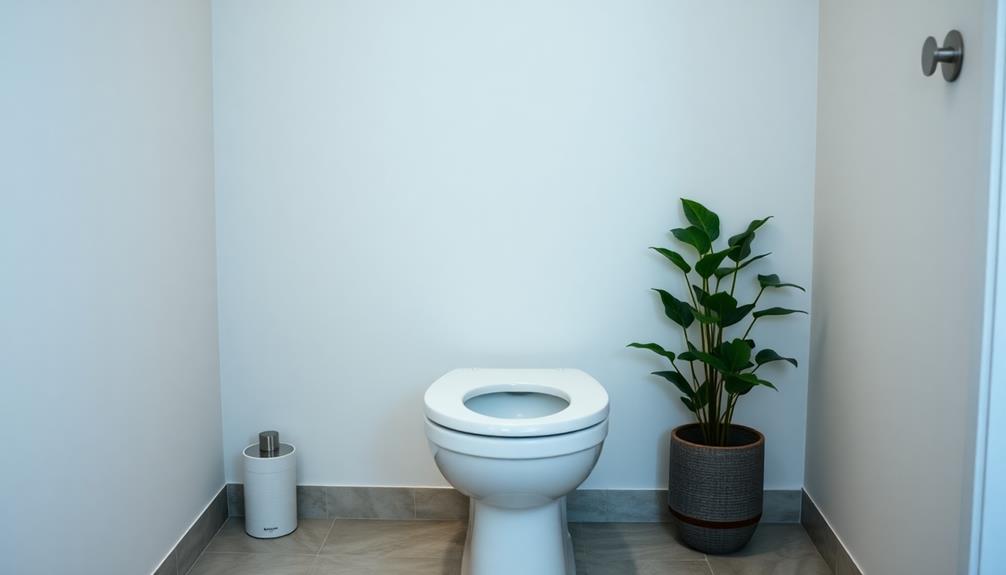If you notice a sweet or fruity smell in urine, it could be a sign of high blood sugar, often linked to diabetes. This distinct odor happens because excess glucose and ketones, produced when your body breaks down fat, end up in your urine. It's crucial to pay attention to these changes, as they can indicate unmanaged diabetes or even diabetic ketoacidosis, which requires immediate care. Increased thirst and frequent bathroom trips might also accompany this smell. Staying aware of these signs can help you manage your health better. There's so much more to discover about urine and diabetes!
Key Takeaways
- Diabetic urine typically has a sweet or fruity odor due to high glucose levels.
- The presence of ketones in urine suggests fat breakdown from insufficient insulin.
- Stronger odors may indicate uncontrolled diabetes or diabetic ketoacidosis (DKA).
- Increased thirst and frequent urination accompany the sweet smell in diabetes.
- Regular monitoring of urine changes is essential for diabetes management and health awareness.
Introduction

When you have diabetes, you might notice that your urine has a distinct sweet or fruity smell. This sweet-smelling urine often appears because of high blood sugar levels and the presence of ketones—substances your body makes when it breaks down fat for energy due to insufficient insulin.
If your diabetes isn't well-managed, your kidneys work hard to excrete the excess glucose, which can lead to this unusual urine odor. Other symptoms, such as relief for heartburn or excessive sweating, can also indicate underlying health issues that need attention.
It's important to pay attention to your body. If you experience sweet-smelling urine along with increased thirst and frequent urination, it could signal uncontrolled diabetes or even diabetic ketoacidosis (DKA), a serious condition that requires immediate attention.
Monitoring your health regularly, including urine analysis, helps you catch changes in urine odor and prevent complications related to high blood sugar.
Description of the Smell

Diabetic urine typically has a sweet or fruity smell that's unmistakable. When you notice this odor, it often means there's a high level of glucose in your body. You see, when your blood sugar levels rise, your body tries to get rid of the extra glucose through urination, leading to that sweet smell.
This odor might become even stronger if you're experiencing uncontrolled diabetes or diabetic ketoacidosis. Additionally, the body's attempt to eliminate excess sugar can be influenced by various factors, such as health benefits of tea that may help manage blood sugar levels. In these cases, your body starts breaking down fat for energy, which produces ketones—those pesky byproducts that also create a fruity odor.
If you're paying attention to urine changes, this sweet or fruity smell can be an important signal for your diabetes management. It's essential to monitor your urine, as these smells can indicate the need for a check-up or a change in your routine.
Source and Composition

The source of the sweet or fruity smell in urine stems from the presence of excess glucose and ketones, which indicate your body's struggle to manage high blood sugar levels. When you have diabetes, your body mightn't use glucose properly, leading to elevated glucose levels in your urine.
This condition can cause osmotic diuresis, meaning you'll produce more urine than normal. Early detection of such symptoms is crucial, as it can help prevent complications associated with diabetes, such as mammography guidelines.
If your insulin levels are critically low, your body might start burning fat for energy instead of glucose. This process produces ketones, which can also make your urine smell fruity. In some cases, like diabetic ketoacidosis (DKA), the ketone levels become significantly high, intensifying that sweet-smelling odor.
Regular urinalysis is a great tool for monitoring your condition. It helps you detect those elevated glucose and ketone levels, allowing for better diabetes management.
Typical Scenarios or Environments

Often, sweet-smelling urine can signal an underlying issue, particularly in individuals with diabetes. When your blood sugar levels are poorly managed, excess glucose can lead to a fruity odor in your urine. This is especially true during stressful times, illness, or after indulging in a high-sugar meal. If you notice this change, it's a good idea to pay attention!
In clinical settings, healthcare professionals often encounter sweet-smelling urine in patients experiencing diabetic ketoacidosis (DKA). This serious condition needs immediate attention, so being aware of your symptoms is crucial. Monitoring your urine odor at home can help you assess your blood sugar control and act accordingly.
It's also important to remember that sweet-smelling urine isn't exclusive to diabetes. Children with metabolic disorders, like Maple Syrup Urine Disease, can exhibit similar symptoms.
This highlights the need for careful diagnosis, as the presence of glucose and ketones can occur in various conditions.
Emotional or Cultural Associations

While many may not realize it, the sweet smell of urine can trigger deep emotional responses, particularly for those living with diabetes and their loved ones. You might feel health anxieties creeping in, as that fruity scent often reminds you of chronic illness.
In some cultures, strong odors, including diabetic urine, can carry a stigma, making people feel embarrassed or ashamed. This stigma can affect how you perceive personal hygiene and even your willingness to seek medical advice.
However, awareness of this odor can also foster empathy and understanding in social settings. It opens up conversations about health management, helping you and others support one another.
Health or Safety Considerations

Understanding the emotional and cultural implications of diabetic urine smell naturally leads to important health and safety considerations.
If you notice your urine has a sweet-smelling odor, it could mean your blood sugar is too high, a condition known as hyperglycemia. This might be caused by uncontrolled glucose levels, so it's essential to monitor your blood sugar regularly.
Sweet-smelling urine can also indicate the presence of ketones, which are produced during diabetic ketoacidosis (DKA). This is a medical emergency!
If you experience this along with symptoms like extreme thirst, fatigue, or confusion, seek help from your healthcare provider right away.
Final Thoughts

When it comes to managing diabetes, paying attention to changes in your urine's smell can be crucial for your health. If your urine smells sweet, it could be a sign of excess glucose or ketones. This often happens during hyperglycemia, when your blood sugar levels are high.
Keeping an eye on these changes is a vital part of your diabetes management. You might notice other symptoms, like frequent urination or extreme thirst, alongside the sweet smell.
Monitoring urine smell isn't just about noticing things; it can help you make important adjustments to your treatment or diet. If you find that your urine consistently smells sweet, especially if you also have abdominal pain or confusion, it's essential to seek medical attention.
Ignoring these signs could lead to serious complications.
Frequently Asked Questions
Can You Tell if You Have Diabetes by the Smell of Your Urine?
You can't diagnose diabetes solely by urine smell, but a sweet or fruity odor might indicate high glucose levels. If you notice this change, it's wise to consult a healthcare professional for proper evaluation.
What Does Unhealthy Urine Smell Like?
Unhealthy urine can smell sweet, fruity, or even foul. If you notice a strong odor, especially with other symptoms, it's important to consult a healthcare professional to rule out any underlying issues.
What Does Ketoacidosis Urine Smell Like?
When experiencing ketoacidosis, your urine might smell sweet or fruity, similar to overripe fruit or nail polish remover. It's crucial to recognize this change, as it can indicate a serious medical condition requiring immediate attention.
What Does Liver Disease Urine Smell Like?
If you're dealing with liver disease, your urine might smell strong, musty, or even fishy. You may notice dark yellow or brown urine, indicating potential bilirubin buildup. It's crucial to monitor these changes closely.









